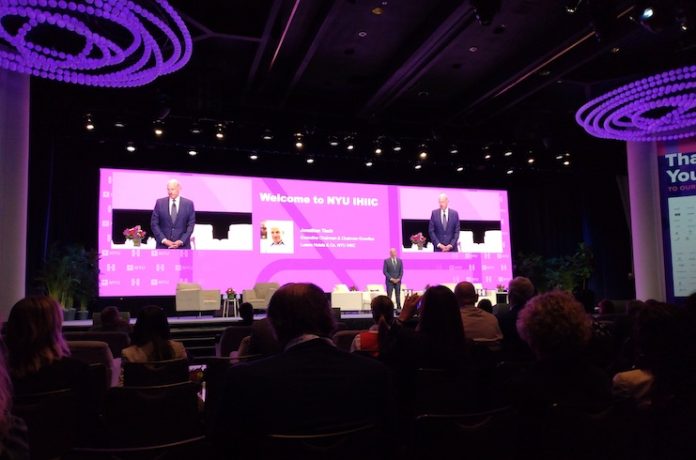
Convening at the Marriott Marquis in New York City, the 46th Annual NYU International Hospitality Industry Investment Conference is themed “Driving Alpha” to express a positive outlook on the hospitality industry, tempered by recognizing ongoing challenges. In his opening remarks today, Jonathan Tisch, CEO of Loews Hotels, noted, “We face challenges like everybody else, pressure on the bottom line, inflation, worker shortages, expenses, rising taxes—all come together in the hotel industry. … But hopefully when you leave here tomorrow, [you will have] a new sense of where the next couple of months will bring us, and you will be better prepared to look for those opportunities.”
Tisch stressed the importance of getting the U.S. government to understand the importance of the national tourism industry and pave the way for more immigration to ameliorate the labor shortage. “They need to work on visa policies; they have to speed up the time it takes to get a visa. If you’re a Mexican citizen and you want to come to this country, it still takes 400 days to get a visa; that is unacceptable,” he said. “We need to work with our elected officials so they recognize what we all do for a living and how we are a vehicle for economic development and job creation.”
Ellen Zentner, managing director and chief U.S. economist, Morgan Stanley, also addressed the labor shortage among other key topics in her opening keynote, “Adapting to an Evolving Macro-Economic Environment.” While there has been some economic slowdown recently, “the country is still in expansion,” Zentner affirmed, and immigration has been robust. “Last year, we had 3.3 million immigrants into the U.S., and the bulk of them authorized—that includes asylum seekers—versus what we thought before, which is 1.3 million. It’s a significant boost to population growth. And massive population growth is faster labor force growth, and then it comes down to what is the labor force participation rate. They can work. It takes about six months. You can apply for a tax ID number.” She cited Illinois as an example of a state that has been “very proactive in getting immigrants into the labor force. They’re issuing driver’s licenses as well—anything to help them become more full economic citizens.”
While labor “demand has been outstripping supply,” the labor market has been in better balance this year, “and we’ll move into oversupply this year,” Zentner noted. Immigrants are largely entering industries such as manufacturing, construction, retail, restaurants, and notably, leisure and hospitality. “And those are the sectors where you’ve seen wage pressures come down faster than other areas of the labor market,” she said. “So, it’s really important that you take advantage of this labor.”
Hoteliers who bolster their operations with a strong labor force are positioned to capitalize on certain opportunities in the current travel market that Zentner cited, including the younger generations’ appetite for experiences. Millennials and Gen Z developed a “proclivity toward experiences over things really … well before COVID. COVID accelerated a lot of these trends that were already in effect.” Another opportunity is the heightened demand from higher-income travelers. “All the things having to do with travel are on fire for the wealthier households,” Zentner said. “The lower- and middle-income households are holding it there; they’re still traveling … about the same as last year. But I put a box around those of the $150,000-plus income. They have a significantly growing intention to travel this year versus last year.”











